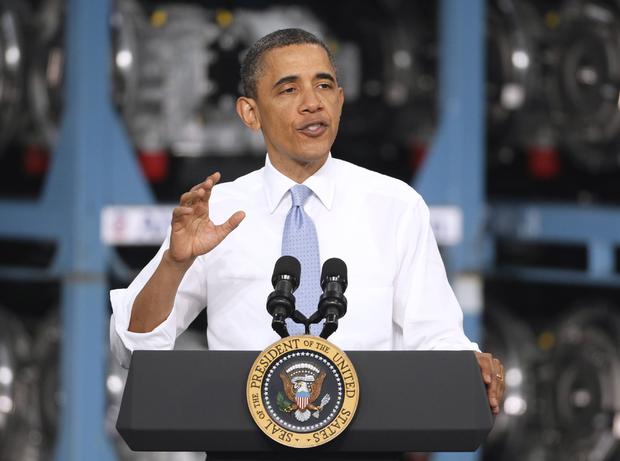Unemployment numbers will weigh heavily on Obama's 2012 campaign
Updated 2:50 p.m. ET
As he pitches his economic plans to voters, President Obama is trying to ignore the disappointing May jobs numbers by focusing on positive long-term trends. His focus is on taking credit for rescuing GM and Chrysler with government bailouts, and for bringing the economy back from the brink of depression.
Austan Goolsbee, Chairman of the Council of Economic Advisers, and a long-time adviser to the president, also took that "glass half-full" approach today, noting that the private sector has added more than 2.1 million jobs over the past 15 months."There are always bumps on the road to recovery," he said in a statement, "but the overall trajectory of the economy has improved dramatically over the past two years."
But try telling that to someone who's been unemployed for much, most, or all of that 2 years. And try telling it to voters next November if the economy continues to stall.
With a gain in May of a meager 54,000 jobs, and with unemployment inching up from 9.0 to 9.1 percent, the economy is looming as an increasingly dark cloud over the president's reelection campaign.
Some pundits on both sides of the aisle have recently opined that the president is already a heavy favorite because the Republican field is so weak. But political analyst Larry Sabato of the University of Virginia says: "There are several candidates who could easily beat Obama if the economy is bad enough. So people who say the Republican field is full of losers are absolutely wrong."
Here's a fact that surely worries the White House: No president since Franklin Delano Roosevelt has won re-election when the unemployment rate was higher than 7.2 percent.
Perhaps the best example of the connection between unemployment and reelection is the first President Bush. In March 1991, after the first Gulf War, his approval rating was a stratospheric 88 percent. Just 16 months later it had plummeted to 31 percent. Why? Because unemployment had soared to 7.5 percent. Mr. Bush went on to lose to Bill Clinton whose campaign theme was "it's the economy, stupid."
The last president to win reelection when the unemployment rate was over 7 percent was Ronald Reagan. Unemployment stood at 7.2 percent when he beat Walter Mondale in 1984. But the key for Reagan was that the economy was improving, which allowed him to run an optimistic "morning in American" campaign.
FDR also ran for reelection when unemployment was high - extremely high - but also won because things were moving in the right direction. When he first won in 1932, Sabato notes, unemployment was 19 percent. Four years later it was still sky-high - 17 percent -- but he won because things were getting better. By 1940 unemployment had inched down to 15 percent, but that positive movement was enough to win reelection again.
As Sabato says: "The perception was things were getting better. The numbers were horrible, but the perception mattered a lot."
Sabato's conclusion based on a review of modern reelection history: "If the economy is going downhill the incumbent president almost always loses, if the economy is improving the incumbent president almost always wins."
Yes, there could be other issues that play an important role - the quality of the campaigns, major national or international events, or even scandal.
But the one constant in predicting reelection winners and losers in recent decades has been unemployment. Most economists believe the unemployment rate will still be over 8 percent on Election Day 2012, but the key for President Obama will be whether it's moving in the right direction.

